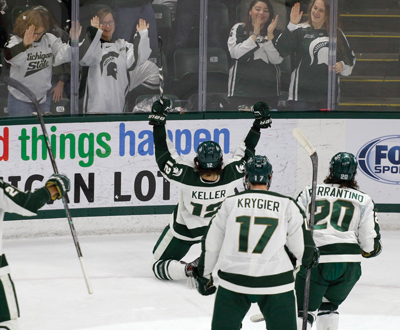Selling tickets isn’t usually that difficult for Michigan State’s popular hockey team. But this winter, with the Spartans suffering through an especially tough season, the athletic department turned to Google to help push tickets.
Through Google’s search-engine marketing, Michigan State saw a 14-to-1 return. Every dollar the Spartans spent with Google resulted in $14 worth of new ticket sales.
 |
The Michigan State program spent money with Google to boost its search visibility.
Photo by: AP IMAGES
|
Jim Donatelli, Michigan State’s assistant director of sales and marketing, said the money the school spent with Google helped push the Spartans’ official website higher on the search page when a fan was searching for tickets.
“What it did was really intensify our presence on Google,” Donatelli said. “Instead of fans going to the secondary ticket market for tickets, they were coming to us.”
Pro teams have been working with Google over the last four to five years to strengthen their online presence through search-engine marketing, a space the secondary market has owned for years. Understanding that the primary sources for tickets — like teams and leagues — were getting pushed to the bottom of the search page, Google developed a live events division that works with them to more effectively sell tickets.
Michal Lorenc, a 14-year veteran at Google, has spent the last four years as the company’s head of industry for live events in the Ann Arbor, Mich., office. His division creates campaigns with teams and leagues so that they have a higher-profile position on the search page.
Over the last several months, this movement to help primary ticket sellers reach their customers has moved into the college ranks, where more than 20 schools have begun advertising with Google to improve their search position.
Spectra Ticketing & Fan Engagement is working with several of its 118 Division I clients to develop a search-engine strategy, with Michigan State, Ole Miss and Stanford being among the earliest adopters last fall. Brandon O’Connor from Spectra’s e-commerce and digital marketing group is spearheading the effort.
Of the 20-plus schools spending money with Google, they’re spending anywhere from $1,000 into the five figures. Michigan State has spent $12,000 with Google during its football, basketball and hockey seasons with an overall 9-to-1 return, Donatelli said.
Google’s analytics can easily track ticket buyers who click on the school’s link from the Google page and go to the Spartans’ ticket site.
“This is the next big trend for our schools,” said Craig Ricks, vice president of marketing at Spectra Ticketing. “In the next three years or so, every college is going to be investing heavily with this.
“A few years ago, it was really hard for the primary ticketing source to make a dent in search because the secondary market and brokers were really dominating. Now we’re working with Google to set up campaigns for our clients and, because they’re the primary ticket providers, they get a higher relevancy ranking with Google than a broker might.”
Schools are working with Google on three types of campaigns. The first is simply a search campaign, which moves the school’s official website higher up on the search page as the consumer is searching for tickets and, theoretically, is in a buying mode. It’s the most basic way to advertise with Google and see an immediate impact.
“It’s so important to get that No. 1 or No. 2 spot,” Ricks said. “That’s where the consumer is going to go.”
Roughly half of the 20-some schools are simply using a search campaign like that.
Some schools also are using Google’s analytics to target potential customers based on their past purchases and browser history, which tells them consumers who might be interested in buying tickets. It essentially helps the school cast a wider net for buyers.
The third type of campaign involves the Google-owned YouTube, which can overlay a call to action to buy tickets over the team’s video content.
Schools have the ability to turn the campaigns on or off, depending on ticket availability. If a game is sold out, there’s no point in continuing to run the advertising with Google.
The more clicks Google generates for the school, the more the advertising costs. Lorenc said a click can range from 50 cents to $3 or $4. The higher the position on the search page, the more expensive the click.
Michigan State saw 5,000 consumers click through to the school’s ticket page during the hockey campaign. Of those, 829 bought tickets, or what the school calls conversions.
Since this is the first season, Donatelli can’t make a year-over-year comparison, but instinctively he thinks the campaign went well, considering the team’s struggles. Not only is the school selling more tickets, it is collecting new data on fans that might not have been in Michigan State’s database previously.
“If you don’t spend, you fall below the fold, so to speak,” Donatelli said. “People are usually searching with an intent to buy and that’s when we’ve got to be near the top of the search page.”




